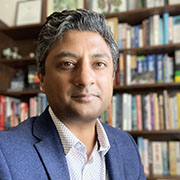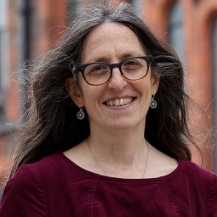Looking to the future
Here at the Arts and Humanities Research Council (AHRC), we’re always thinking about the future. It underpins everything from our funding opportunities to strategic thinking on long-term trends, challenges and opportunities for our sector. It is driven by the central theme that the arts and humanities help us understand who we are as humans and the world around us.
We know we’re not alone in this. Each year we fund hundreds of exciting projects, of all shapes and sizes, covering an array of disciplines, topics and approaches. The golden thread running through all of them is the desire to move the arts and humanities forward. These projects innovate, expand our horizons, deepen our knowledge and develop our people.
Responsive mode changes
Creating the right conditions for forward-thinking applications has been a key focus for us, particularly in the context of the recent changes we’ve made to our responsive mode offer. A year ago, I wrote a blog introducing two new funding opportunities, Curiosity and Catalyst. Today, I’m pleased to be introducing another.
Mission is a pilot large grants funding opportunity. It aims to transform arts and humanities research agendas, research leadership and research teams, at scale, through a pilot approach to team convening.
To bring Mission to life, we’ve partnered with the Thrive project and I’m delighted to be sharing the rest of this blog with Professor Georgina Endfield, who is leading the project. We want to share a little more about Thrive and about Mission, as we ask our community to join us in exploring our new approach.
What is Thrive?
Thrive is a two-year project funded through the Research England Development Fund. The project is led by the University of Liverpool and is being run in partnership with AHRC and Advance HE. Our key goal is to define and develop an approach for team-based research.
The foundation for the work is the drive for more inclusive team-led research approaches across the sector. It’ll build on existing ‘team science’ and radical collaboration approaches, and the ambition is to provide an alternative to the traditional principal investigator-led model.
One of our core aims has been to identify the steps that need to be taken to increase the diversity of leadership voices in research, including technical and professional services colleagues, early and mid-career academics and under-represented groups. This is with a view to exploring how the combination of whole team expertise might lead to better research, while fostering a more positive research culture.
A team-convening approach
The Thrive project seeks to better understand what changes may be needed to existing systems and processes to support this approach. Since autumn 2023, we’ve carried out broad engagement through a series of workshops and events to gain insights and feedback from a range of stakeholders across the sector on the challenges and opportunities presented by team-led working.
These findings have helped to shape a team-convening approach that enables a shift in emphasis away from the traditional principal investigator-led model of research to a more inclusive, teams-led approach. Many of our stakeholders from across the research community were on board from the beginning and attended multiple engagement sessions. Their invaluable input helped to develop and refine the approach and its principles at each stage.
Team convening is underpinned by five key principles for teams to follow:
- emphasising and enabling collective capability
- shared leadership
- inclusive governance
- team development
- reflexive practice
What is Mission?
Mission provides us with an opportunity to match the team-convening approach the Thrive project has co-developed with a real funding opportunity.
It furthers our commitment to inclusion and to taking a people-centred approach that broadens the diversity of whom and what we fund. This has underpinned our approach to all our new responsive mode funding opportunities.
It will fund team-led projects between £2,000,000 and £3,000,000 for up to four years.
What we’re looking for
We’re looking for bold, impactful projects that convene expertise from across the research ecosystem to advance ambitious arts and humanities led research agendas. We want these projects to come from inclusive and collaborative teams with diverse membership, great ideas and a real desire to meaningfully explore and engage with the team-convening approach.
Consistent with our wider approach to responsive mode opportunities, we’re looking to applicants to tell us what you need. We want applicants to define the research agenda that they will advance, the team that’ll be brought together and why they need a Mission award.
We anticipate making two to three awards. We will be adopting a two-stage approach to assessment. To start with we will only be asking for outline applications with no financial information required. We’re looking for genuine outline applications that demonstrate potential and engagement with the approach but may not have all the answers at this stage. Following this outline stage, applications shortlisted by assessment will be invited to submit a full stage application. At that point, there will be support to enable applicants to develop the next level of detail.
Taking a pilot approach
We want to be bold and ambitious; Mission will require us all to work in new ways. It’s the largest amount of funding we’ve offered through our responsive mode opportunities. We’re encouraging you to work in ways that might feel very new and different. There are system, process, policy and assessment challenges that we are working through and will need to continue to explore as the opportunity develops.
We’re therefore taking a pilot approach with the aim of learning as we go and then taking those insights, understanding what went well and what went less well for all of us, and using that information to inform our next steps.
AHRC partnered with Thrive because we want to understand the challenges and opportunities of working with a team-convening approach through a tangible funding opportunity. Through the process of exploration, we hope we can set a course for the future of not only the arts and humanities, but also the way research is done across the wider research and innovation sector.
Next steps
Mission will go live on the UK Research and Innovation funding finder in the week commencing 13 May 2024. If you’d like to find out more, we’re also offering online applicant webinars on the following dates:
- webinar one: 23 May 2024 at 11:00am to 12:00pm UK time
- webinar two: 30 May 2024 at 12:00pm to 1:00pm UK time
Once registered, you will receive a confirmation email containing information about how to join the webinar via Zoom.
Top image: Credit: Andy Hermawan on Unsplash






